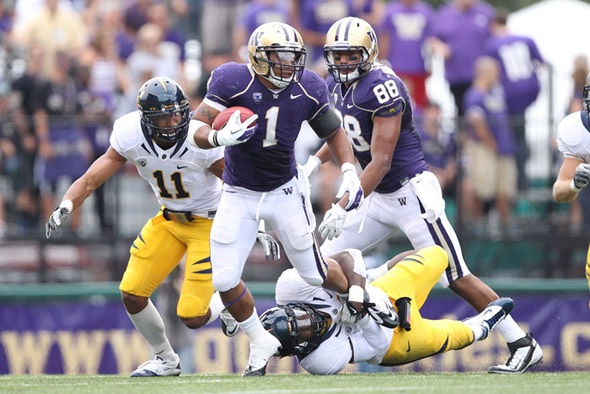
Lost amid the angst over a Washington defense that is playing as poorly as any in the 121-year history of the program, and concerns over how that defense might respond in the wake of a 65-21 shelling at Stanford, is the fact that on Saturday against Arizona running back Chris Polk has an opportunity to knock Napoleon Kaufman down a significant statistical rung.
Polk will enter Washington’s eighth game of the year with an opportunity to put up the 18th 100-yard rushing game of his career. If he does it, he will break a tie with Kaufman (1991-94) for most 100-yard games in a UW career.Even if Polk fails to crack 100 Saturday, he is apt to get the record at some point this season, and several others besides.
Polk isn’t as fast or as quick as Kaufman, or as big and strong as Corey Dillon (1996), and he certainly doesn’t have the breathtaking open-field moves that awed Husky fans in the 1950s when Hugh McElhenny set rushing standards that lasted for three decades.
But such is Polk’s statistical assault on the school record book that he is going to be the UW running back against whom all future Washington runners are measured.
In addition to his 17 100-yard rushing games, Polk has a reasonable chance of eclipsing Kaufman as the school’s all-time rushing leader. Polk, with 3,433 career yards, needs 674 to surpass Kaufman, and would need to average 134.6 yards in Washington’s final five games to accomplish that feat.
Polk is currently averaging 124.3 yards per game, so the order is tall. But Polk already demonstrated an ability to bust through with big rushing games, evidenced by the 143 yards (and two touchdowns) he put up against Stanford last week, and especially evidenced by the 284 (second most in school history) with which he battered Washington State in the final game of the 2010 regular season.
We doubt that after Polk leaves school (this is probably the junior’s final season) he will be remembered as the greatest running back in Husky history. McElhenny, after all, is in the College Football Hall of Fame and the College Football Hall of Fame.
Dillon, who averaged 144 yards per game and scored 24 TDs in his only season as a Husky (1996), also rushed for more than 10,000 yards in the NFL. And backs such as Joe Steele and Greg Lewis will always have their admirers.
But historical comparisons are almost always based on numbers, and Polk has been a more productive running back, in terms of yardage gained, than any UW runner who came before him. With his 143 at Stanford, Polk is averaging 100.9 yards per game for his career, making him the only back in school history to average 100 per.
The chart demonstrates that no other back in UW annals even averaged 90 rushing yards per game:
| Player | Career | Games | Yards | Per Game | Best |
|---|---|---|---|---|---|
| Chris Polk | ’08-11 | 34 | 3433 | 100.9 | 284 vs. WSU, 2010 |
| Hugh McElhenny | ’49-51 | 28 | 2499 | 89.3 | 296 vs. WSU, 1950 |
| N. Kaufman | ’91-94 | 46 | 4106 | 89.3 | 254 vs. SJS, 1994 |
| Joe Steele | ’76-79 | 39 | 3168 | 81.2 | 193 vs. WSU, 1978 |
| Greg Lewis | ’87-90 | 39 | 2903 | 74.4 | 205 vs. Cal, 1990 |
| Rashaan Shehee | ’94-97 | 33 | 2381 | 72.2 | 212 vs. WSU, 1995 |
| Jacque Robinson | ’81-84 | 37 | 2636 | 71.2 | 203 vs. TX Tech, 1982 |
| Robin Earl | ’73-76 | 37 | 2351 | 63.5 | 169 vs. UCLA, 1976 |
| Louis Rankin | ’04-07 | 40 | 2480 | 62 | 255 vs. Stanford, 2007 |
| V. Weathersby | ’85-88 | 46 | 2811 | 61.1 | 177 vs. WSU, 1986 |
Polk separates himself in one other purely subjective way. In our view, he is the best modern-era UW runner after getting hit. His second and third efforts are reminiscent of those routinely made by Marshawn Lynch of the Seahawks, and are the main reason why Polk stands of the precipice of a major Washington rushing record.

2 Comments
Interesting that five of the best performances listed in the article were against WSU.
Interesting that five of the best performances listed in the article were against WSU.